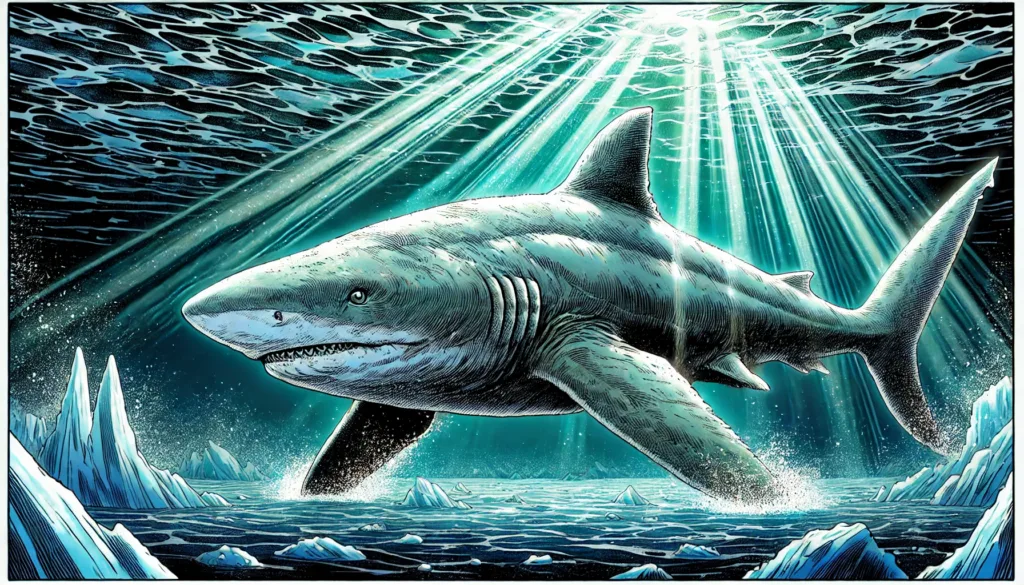Greenland sharks have emerged as fascinating subjects of scientific inquiry due to their remarkable longevity, capable of living up to 400 years. These elusive creatures, found primarily in the cold waters of the Arctic and North Atlantic oceans, are among the longest-lived vertebrate species on Earth. Known scientifically as Somniosus microcephalus, they are characterized by their massive size, with adults typically ranging from 8 to 23 feet in length and weighing up to 1.5 tons. Despite their imposing stature, Greenland sharks are slow-moving and have adapted to survive in environments where resources are limited and temperatures are frigid.
One of the most astonishing aspects of Greenland sharks is their slow growth rate. Unlike many other fish species, which grow rapidly during their early years, Greenland sharks exhibit an exceptionally gradual growth trajectory. Researchers estimate that these sharks grow at a rate of only a few centimeters per year, a pace that contributes to their longevity but also poses challenges in terms of adapting to environmental changes and reproductive cycles.
Greenland sharks are opportunistic feeders, known to consume a wide range of prey including fish, squid, seals, and even other smaller sharks. They are capable of diving to depths of over 2,000 meters (6,600 feet), where they hunt for food in the darkness of the deep ocean. Despite their ability to consume large quantities of food, studies have shown that Greenland sharks can survive on surprisingly small amounts of nourishment. For instance, a study published in 2022 estimated that a 493-pound Greenland shark could sustain itself on just 2 to 6 ounces of food per day, highlighting their efficient use of energy and resources.
In recent years, scientific interest in Greenland sharks has intensified, driven by efforts to unravel the secrets of their extraordinary lifespan. Studies have confirmed that some individuals can live well beyond two centuries, with the oldest specimens documented to be at least 272 years old. These findings challenge conventional notions of vertebrate aging and prompt questions about the biological mechanisms that enable Greenland sharks to thrive for such extended periods.
Ewan Camplisson, a PhD student at the University of Manchester, has been at the forefront of research into Greenland sharks’ longevity. His studies focus on understanding the metabolic processes and physiological adaptations that contribute to their remarkable lifespan. At the Society for Experimental Biology Annual Conference, Camplisson presented research indicating that Greenland sharks may exhibit minimal decline in metabolic rate as they age—a finding that contrasts sharply with patterns observed in most other vertebrates, including humans.
Camplisson’s research involved analyzing metabolic enzymes in preserved Greenland shark muscle tissue. He found that these enzymes showed consistent activity levels across individuals estimated to be between 60 and 200 years old. This discovery suggests that Greenland sharks may possess unique biochemical adaptations that help maintain cellular function and energy production over centuries, thereby contributing to their longevity.
While Camplisson’s findings provide valuable insights, he emphasizes that aging is a complex biological process influenced by a combination of genetic factors, environmental conditions, and physiological changes. In humans, aging involves a gradual decline in cellular repair mechanisms, increased susceptibility to disease, and changes in metabolism. Greenland sharks offer a unique model for studying these processes, as their longevity may be linked to specialized adaptations that protect against cellular damage and preserve tissue integrity over time.
Beyond their biological significance, Greenland sharks face significant challenges in adapting to rapid environmental changes. As apex predators in Arctic and North Atlantic ecosystems, they play a crucial role in maintaining ecological balance. However, their slow reproductive rate and limited ability to adapt to warming temperatures and marine pollution make them particularly vulnerable to environmental pressures.
Conservation efforts are essential to safeguarding Greenland sharks and their habitats. The species is currently classified as “Near Threatened” by the World Conservation Union, underscoring the need for proactive measures to protect their populations. Understanding the unique adaptations that contribute to their longevity can inform conservation strategies aimed at mitigating the impact of human activities on marine biodiversity.
Greenland sharks continue to captivate researchers with their exceptional longevity and biological resilience. Their ability to survive for centuries in harsh Arctic conditions provides valuable insights into aging processes and underscores the importance of environmental conservation. By studying these enigmatic creatures, scientists hope to unlock new discoveries that could benefit both marine ecosystems and human health. As research progresses, the lessons learned from Greenland sharks may pave the way for innovative approaches to promoting sustainable living and enhancing resilience in the face of global environmental challenges.
If you like the article please follow on THE UBJ.
